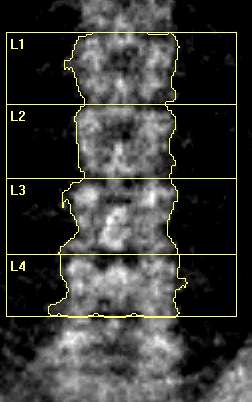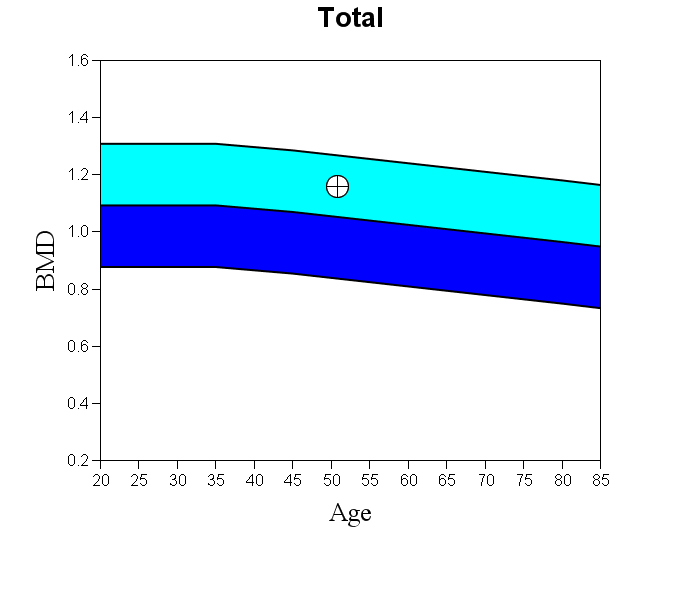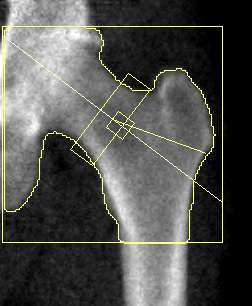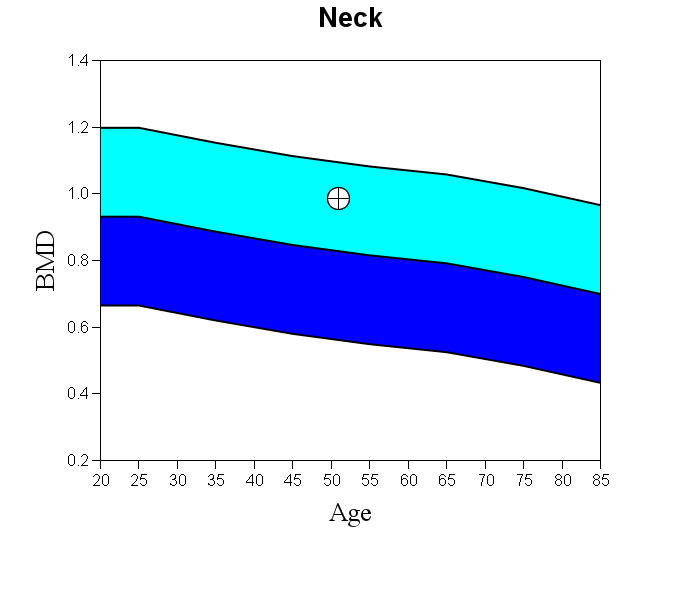Example DEXA Osteoporosis Scan Report
Sample Report
Date of Birth:
| Date | Mon 23rd Feb 2026 9:00 |
|---|---|
| Tests | DEXA Osteoporosis Scan |
23rd Feb 2026
DEXA Osteoporosis Scan
Carried out by Tod
DEXA Spine Scan Results
A spine scan, focusing on the lumbar spine, assesses bone mineral density (BMD), crucial for diagnosing osteoporosis and predicting fractures. It's particularly effective in evaluating vertebral fractures, which lead to pain, deformity, and height loss. Providing valuable insight into spine health, these scans are vital for maintaining skeletal integrity and mobility.

| Area (cm²) | BMC (g) | BMD (g/cm²) | T-Score | Z-Score | |
|---|---|---|---|---|---|
| L1 | 18.26 | 19.67 | 1.078 | 0 | 0.4 |
| L2 | 17.88 | 20.22 | 1.131 | 0.3 | 0.7 |
| L3 | 20.11 | 24.36 | 1.211 | 1 | 1.4 |
| L4 | 19.25 | 23.33 | 1.212 | 1.1 | 1.5 |
| Total | 75.5 | 87.58 | 1.181 | 0.6 | 0.5 |
Total BMD CV 1.0%
- The T-score shows how your bone density compares to the optimal peak bone density for your gender
- The Z-score shows how your bone density compares to the bone densities of others of the same age, gender, and ethnicity
- BMC (g) shows the bone mineral content in grams for each vertebra
DEXA Spine Scan Results

The T-score shows how your bone density compares to the optimal peak bone density of a 25 year old for your gender
The World Health Organization (WHO) defines osteoporosis and osteopenia based on T-scores:
- Normal bone density: T-score above -1 SD
- Osteopenia (low bone density): T-score between -1 and -2.5 SD
- Osteoporosis: T-score of -2.5 SD or lower
T-Score is 0.6. You have Normal Bone Density.
- The Graph above shows how your bone density compares to the bone densities of others of the same age, gender, and ethnicity
- The line through the middle shows the average for your age, with the section above showing above-average scores, and the section below showing below-average scores.
DEXA Left Hip Scan Results
Hip scans, designed to measure bone mineral density (BMD) specifically at the femoral neck, play a critical role in identifying osteoporosis-related fractures. These scans offer valuable insights into the risk of hip fractures, known for their severe repercussions like reduced mobility. Particularly crucial for older adults and individuals at risk of hip fractures, hip scans provide essential data concerning bone health in the hip region, aiding in proactive management and prevention strategies.

Breakdown
| Area (cm²) | BMC (g) | BMD (g/cm²) | T-Score | Z-Score | |
|---|---|---|---|---|---|
| Neck | 5.94 | 5.86 | 0.987 | 0.4 | 1.2 |
| Total | 41.98 | 49.57 | 1.181 | 1 | 1.3 |
Total BMD CV 1.0%, ACF = 1.046, BCF = 1.017, TH = 7.567
- Please Note: T scores and Z scores are not available for children or teenagers under 20 years old, and are less reliable for anyone over 85 years old.
- FRAX Scores can only be calculated for T score values above -2.5.
- FRAX Scores can only be calculated on hips.
DEXA Left Hip Scan Results
The graph below shows a pictorial representation of how your results compare to those of others in your age, sex, and ethnic group for comparison.

Bone Density
Based on the overall information contained in this report
your
WHO Classification is: Normal Bone Density.
T-Score is 0.4
Interpreting your Dexa Scan Results
BMC
BMC stands for Bone Mineral Content, and it is typically measured in grams (g). BMC refers to the total amount of minerals (primarily calcium and phosphorus) present in the bones. It is an important component of bone health assessment, along with bone mineral density (BMD).
BMD
BMD stands for Bone Mineral Density. It refers to the amount of mineral (primarily calcium and phosphorus) present in bone tissue, typically measured in grams per square centimetre (g/cm²) or grams per cubic centimetre (g/cm³). Bone mineral density is a key indicator of bone strength and density, providing valuable information about bone health.

A huge thanks
On behalf of the entire team at BodyView, we would like to express our appreciation for coming to see us. Your business is super important to us,
and we are deeply committed to helping you achieve your goals. Should you require any further assistance, please do not
hesitate to reach out; we are here to help.
If your experience with us has been a positive one, it would be really appreciated if you could take a moment to share your feedback by leaving a
review on Trustpilot or Google.
Kindest Regards
Team BodyView.
This report was compiled using BodyCompPro software for DEXA scanners, providing you with gold standard results interpreted through the most advanced body composition software available.
Disclaimer
The information provided is for general guidance and not a substitute for professional advice. Always consult a healthcare professional before starting any fitness or weight loss program, especially if you have health conditions or take medications. Use the information at your own discretion and responsibility.

